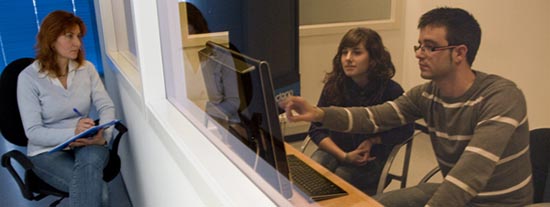IBuX-Lab Interaction and UX Laboratory
The IBuX-Lab is an interactive research laboratory. It is an infrastructure of the CER Technological Studies Center for Dependency and Independent Living (CETpD), whose mission is to develop technological solutions to improve the quality of life and autonomy of people. The contribution of the IBuX-Lab is the systematic study of behavior for the optimization of interaction in order to meet the needs of users in a personalized way, whatever their abilities.
The IBuX-Lab, directed by Dr. in psychology Marta Díaz Boladeras, is designed for the controlled and non-intrusive observation of people using objects in order to provide evidence-based knowledge that is useful to developers in the various phases of design, from conceptualization to test.
The laboratory conducts studies with users applying qualitative (interviews, focus groups) and quantitative (questionnaires, behavioral sequences, logs, psychophysiological signals) techniques. The tasks that are carried out range from the analysis of requirements (modeling of users, investigation of the needs and preferences of the target group), to the assessment of impact on behavior, quality of life and health, through the 'evaluation of the experience of use (reports of usability and accessibility of devices).
On the scientific side, our goal is to characterize, model and understand interactive behaviors. We investigate the experience of use in its context, the dynamics of the interaction of people with interactive and personified technologies (person-robot interaction), especially in systems designed to address special needs such as those related to aging, loss of abilities or sensory limitations. Our current challenges are the integration of behavioral data in the design of intelligent and adaptive interfaces that can provide continuous and personalized support to people with special needs.
MEASURE
Monitoring via wearable sensors of robotic walker users with mobility problems (RTI2018-096701-B-C22). Funded by the 2018 call for "Research Challenges I+D Projects" for 3 years starting 05/2019
This project aims to improve the autonomy and, therefore, the quality of life of people with reduced mobility, proposing a system made up of a robotic walker and portable sensors to continuously adapt mobility assistance in depending on the needs of the user and their psychological comfort. Tests have been carried out with users, building a circuit with several walking tests and obtaining data both from wearable sensors, behavioral data recorded on video and self-reports.
PATRICA
Pain and Anxiety Treatment based on social Robot Interaction with Children to Improve patient experience (TIN2012-38416-C03-01,02,03). Funded by the National R+D+I Plan for 3 years starting on 01/02/2013 Partners: La Salle Engineering - University Ramon Llull, Hospital Sant Joan de Déu.
Design of innovative interventions based on social robots in order to improve the experience of the pediatric patient, eliminating or minimizing pain and anxiety. The aim of this research is to design and develop an effective interaction between children and pet robots endowed with socially situated behavior, capable of developing the role of companion. The aim of this project is to design and develop a specific human-robot interaction with pet robots and evaluate its impact on children and care systems in the hospital.
MIND
The MinD European project: The development of a mindful design to improve self-empowerment and social engagement in people with dementia (H2020-EU.1.3.3 Grant agreement ID: 691001) March 2016 to February 2020.
The aim of the MIND project is to improve the empowerment and social participation of people suffering from mild dementia who live at home through different actions based on collaborative research, around these axes: a) develop a user-centered and participatory design approach, involving in every step of the project people with dementia and their carers b) the development of wearable devices that support the perception of identity, the management of emotions, the understanding of the environment and the reduction of cognitive overload and feelings of incapacity.
INREDIS
Relationship interfaces between the Environment and Persons with Disabilities. CENIT project (Consorcios Estratégicos Nacionales de Investigación Técnica) CEN-2007-2011 registered in the INGENIO 2010 initiative, financed by the Ministerio de Industria, Turismo y Comercio.CENIT, MTAS, 2007-2011.
Field research on the degree of accessibility of the interfaces of the existing information and communication systems in the different areas. Its objective is to inform the development of basic technologies that allow the creation of effective communication channels between people with disabilities and technological environments, in various scenarios such as work, home, public space and mobile telephony.
AGEDA
Care and management for dependency. AVANZA project, financed by the Ministry of Industry, Tourism and Commerce for 1 year starting on 01/01/2009.
Development and evaluation of a multimedia application for elderly people living alone at home, in order to alleviate feelings of isolation and loneliness, and compensate for the loss of memory and other cognitive functions, in a friendly environment , playful and fun. The functionalities of the platform include video calls to family and friends, medical consultations, appointment management of various services and orders to a supermarket.
Equipment
- Test room. Two digital cameras, lighting, one-way mirrors and control room separator.
- Control room. Two high-resolution color video monitors, video mixer, DVD recorder, software, OBSERVER TX by Noldus.
- Direct observation area. Allows you to witness the activity live without being seen by the participants



Share: